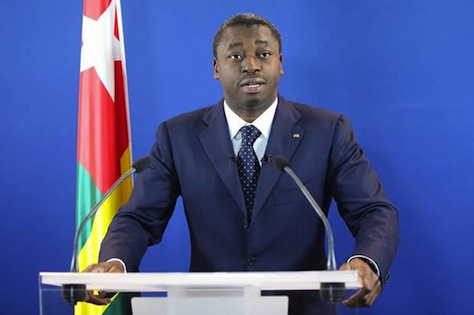Guest post by Kevin Buettner
Even in the neglected word of African electoral politics, Togo isn’t necessarily a top story, especially coming so shortly after the blockbuster Nigerian election.![]()
But less than three weeks before Togo was scheduled to head to the polls to determine their next president, the Economic Community of West African States (ECOWAS) successfully petitioned the Togolese government to revise its voter registration lists. The subsequent delay stems from allegations by opposition parties that thousands of voter lists contained the names of citizens who were registered twice — and most of the names were considered persons loyal to the incumbent president Faure Gnassingbé.
This is not the first time the opposition has raised concerns relating to the upcoming elections. In late 2014, a coalition aptly named ‘Let’s Save Togo’ led street protests to highlight the unpopularity of the 2002 decision to suspend presidential term limits, which now allows Gnassingbé to run for a third term as Togo’s president. Thirteen years ago, however, the decision facilitated what would become the 38-year rule of Gnassingbé’s father, Gnassingbé Eyadéma, a polarizing political figure in his own right.
With the sudden death of his father in 2005, Gnassingbé was appointed president by the Togolese military, stood down amidst ECOWAS pressure, and was elected the same year with 60% of the vote in a suspect election. Approaching the end of his second term, Gnassingbé is seeking to extend the now dynastic rule of Togo by his family. Their combined tenures clock in at 48 years, or over 87% of the time that Togo has been a sovereign country since winning independence from the French colonial empire in 1960.
The most serious challenge to Faure is Jean-Pierre Fabre, the leader of the Combat pour l’Aternance Politique 2015 (CAP, Combat for Political Change 2015), an alliance of opposition parties. That Fabre represents a serious challenge is remarkable, as Fabre had not run for nationwide office prior to the 2010 presidential elections, and though he took over 34% of the vote, he was criticized for being too inexperienced and lacking significant experience, though he has served as secretary-general since the founding of his party, the Union des Forces du Changement (UFC, Union of Forces for Change).
Without international monitoring, there is little reason to believe the elections in Togo, now postponed until April 25, will be free and fair. The most likely scenario is that Gnassingbé will win a third term, further marginalizing the opposition, thereby making Togo less a democratic state, and more an authoritarian state as it was widely considered under Gnassingbé’s father.
In widely disputed and long-delayed July 2013 parliamentary elections, the ruling Union pour la République (UNIR, Union for the Republic) won 62 of 91 seats in the Assemblée nationale (National Assembly).
A sliver of a country nudged between and Ghana and Benin, Togo is home to 7.15 million people, many of whom live in poverty — the country’s real GDP per capita is just under $1,100, and the country’s chief exports are cocoa and cement components. Togo is a country with something of an odd history — it was occupied in the 18th century by Danes, in the 19th century by Germans and by the French and British in the early 20th century (colonial ‘Togoland’ was ultimately split between the French east and the British west, which would become the Gold Coast, or Ghana, today). Its first president was assassinated, and Eyadéma quickly took the reigns of power in 1967. Despite elections, Togo has resisted the kind of democratic transitions of neighboring west African countries like Ghana, Senegal and, most recently, Nigeria.
